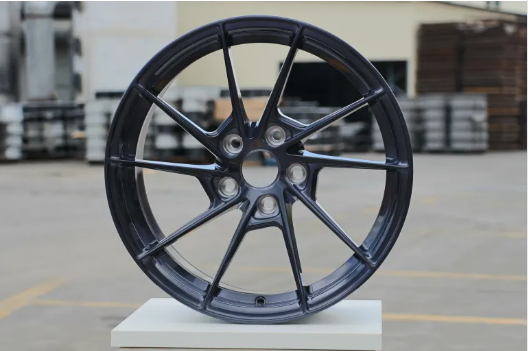What's the difference between alloy and aluminum wheels? Learn how they compare in material, performance, and why the distinction matters for your vehicle.
What’s the difference between alloy and aluminum wheels? It’s one of the most repeatedly asked questions. And understandably so, as many people confuse the two.
So are they the same?
In a way, yes. But not entirely.
In short: All aluminum wheels are alloy wheels, but not all alloy wheels are made from aluminum.
But there’s more to it than that. If you’d like to get a deep dive, then keep reading…
Let’s clear up the confusion.
Alloy wheels are made from a combination of metals, rather than a single metal.
Most commonly, the primary metal used in the process is aluminum, which is mixed with other metals. As an example, nickel or magnesium to improve its strength and durability.
Aluminum wheels, on the other hand, are often misunderstood as being made from pure aluminum. However, it is not the case. When people refer to “aluminum wheels,” they’re in fact talking about aluminum alloy wheels, not wheels made from pure aluminum.
As a matter of fact, pure aluminum wheels don't exist. Why? Since aluminum in its pure form lacks the strength which is required for vehicle use.
Hence, when we talk about aluminum wheels. We simply mean that aluminum is the primary metal in the alloy, supported by other elements to strengthen it.
That being said, aluminum wheels are a type of alloy wheel. Accordingly, all aluminum wheels are alloy wheels, though not all car alloy wheels are necessarily aluminum-based.
Talking of the composition of aluminum wheels vs alloy wheels, it generally includes:
● Aluminum as the base metal
● Nickel or Magnesium for better strength and flexibility
Standardly, aluminum/alloy wheels are in general manufactured using the following methods, including but not limited to:
● Casting: Molten aluminum is poured into a mold. This is practical for complex designs, plus it’s slightly economical.
● Forging: A solid piece of aluminum is compressed under high pressure.
● Flow Forming: A hybrid technique that begins with casting and then stretches and compresses the material for added strength.
Aluminum/alloy wheels are considerably lighter compared to standard steel wheels. Thereby, it directly impacts how a vehicle drives.
Less weight equates to less strain on the engine and suspension. Therefore, resulting in better performance and fuel average.
Further, aluminum alloy wheels are better at heat dissipation than steel, which helps keep brake temperatures lower. Hence, minimizing the risk of brake fade makes it a safer option.
That said, while all aluminum wheels are alloy wheels, not all car alloy wheels are created equal. The specific blend of metals and the method used in manufacturing — whichever casting, forging, or flow forming — also determines the final wheel’s strength, responsiveness, and weight.
As an example, forged wheels tend to be even lighter and stronger than cast ones, most commonly used in performance or high-load applications.

● Better Heat Conduction: Alloy wheels dissipate heat better than steel, therefore improving braking performance.
● Fuel Average: The lighter weight helps minimize the overall load on the engine.
● Better Performance: Better acceleration, cornering, and braking due to lower unsprung weight.
● Corrosion Resistance: Aluminum is more resistant to rust/corrosion.
● Aesthetic Appeal: Endless design options and finishes are available.
● "Alloy" Means Expensive: Whilst high-end alloy wheels can be pricey, however, there are many affordable options available.
● "Aluminum Wheels Are Weak": Modern manufacturing processes used by top alloy wheel companies make aluminum wheels incredibly strong and reliable.
● "Steel Is Always Better for Winter": Although steel wheels are much used in winter due to their toughness, aluminum alloy wheels can also perform just as well.
● Daily Driving: Aluminum alloy wheels are impeccable due to their blend of durability, performance, and aesthetics.
● Performance Cars: JWHEEL has a range of custom alloy wheels specifically engineered for performance vehicles.
● Off-Road Vehicles: Own an off-road vehicle or SUV? We have rugged alloy wheels designed to withstand tough terrains without compromising on style.
● Winter Conditions: If corrosion is a concern, consider aluminum wheels with a proper finish or use dedicated winter wheels.
JWHEEL is one of the leading Chinese alloy wheels manufacturers, proudly serving the global automotive industry since 1999. That’s over two decades!
In the industry, precision, performance, and innovation are non-negotiables — and we’ve built our reputation around delivering just that.
Our state-of-the-art production facility is equipped with the industry's most advanced casting, spinning, machining, painting, and inspection equipment. Fully automated robotic platforms and cutting-edge testing systems guarantee that every wheel meets the exacting standards of clients worldwide.
Extensive Testing Capabilities: From material analysis and hardness testing to fatigue, impact, and dimensional accuracy checks. Our complete in-house testing ecosystem guarantees product safety, structural integrity, and long-term reliability.
Advanced R&D and Engineering: Our in-house R&D team leads the way in product innovation. We handle everything from design and mold development to trial production and technical support.
Customization & Scalable Production: We do have an annual capacity of 1.5 million wheels. We offer scalable manufacturing for all types of alloy wheels — tailored to the unique needs of our global partners.
Global Reach & Trusted Reliability: Being in the industry for over two decades, JWHEEL has earned a reputation as a trusted supplier to some of the world’s most recognized alloy wheel brands. Our commitment to quality, consistency, and customer success has built long-term partnerships across global markets.
Contact us today for a custom quote or OEM solution tailored to your business.